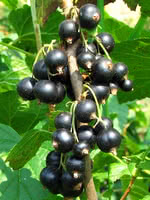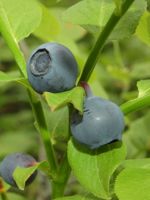Mon-Fri 9am - 5pm Mountain time
Blackcurrant vs Bilberry
Ribes nigrum
Vaccinium myrtillus
CUSTOM GROW
Blackcurrant is a medium-sized shrub producing delicious, deep purple to black sweet berries suitable for jams, jellies, syrups and cordial.
Our Blackcurrant is grown from seed from the "Ben" series of Blackcurrant cultivars, developed by the Mylnefield Research Station in Scotland with a focus on cold hardiness and heavy commercial fruit production. Our seedlings will be slightly different due to hereditary differences but will be very similar to this series.
Bilberry is a native perennial shrub valued for its small, blue-black berries that ripen in mid to late summer. The berries resemble blueberries but have a richer, more tart, and intense flavor. They have long been used for fresh eating, baking, and preserves, while also providing food for birds and mammals. In spring, its delicate pinkish flowers attract bees and other pollinators.
Growing low to the ground, Bilberry forms spreading colonies that create dense understory cover. This growth habit provides food and shelter for wildlife, and its foliage adds seasonal interest by turning red to purple in autumn. With its adaptability and ecological benefits, Bilberry is well-suited for naturalization, ecological restoration, and pollinator gardens.
Blackcurrant Quick Facts
Bilberry Quick Facts
Toxicity: leaves may be unsafe in high doses

